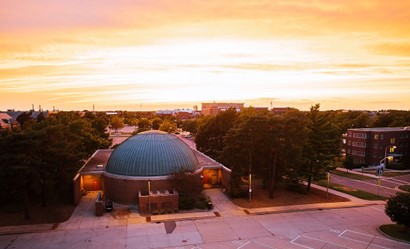
Climate Stories Collaboration Launches
VIENNA, VIRGINIA / AGILITYPR.NEWS / October 02, 2024 / Helping Communities Share Their Stories of Climate Impact
Planetariums often use stories to teach their guests about far-off exotic planets, but Climate Stories will bring the focus much closer to home. This collaboration partners planetariums with community organizations to develop local, data-driven visually immersive stories about the impacts of climate change in their surrounding communities.
"Climate Stories: A Community and Planetarium Partnership Model to Develop Local Data-Driven Visual Impact Narratives” co-creates local climate impact stories tailored to their community and measures impacts of the initiative.
“Given the urgency for acting, planetariums and other informal learning environments must play a critical role in educating the public on climate science,” said Tiffany Stone Wolbrecht, interim director of education and public engagement at AUI. “Planetariums as a global network of fundamentally local or regional institutions are perfectly positioned to communicate climate science through local stories and, through recent technological advances, can use data visualizations to seamlessly connect the local to the global perspective.”
Climate Stories uses a multi-phased approach to articulate, test and refine a collaboration model that will be shared with the broader informal science learning communities. Applied research will support project progress by monitoring the health and vitality of the partnerships, verifying the quality and effectiveness of the climate stories, and working closely with all nine project partnerships to shape evaluative thinking. Partnerships will be supported in their local efforts to collect and interpret outcome and impact data. Equitable collaboration frameworks will be utilized to create stories that are culturally sensitive, share only what is shareable, and to develop distribution plans that are appropriate and not appropriative.
Climate Stories will share a collaboration guide called Promoting Unique Local Science Engagement, or PULSE Guide, which will feature a dynamic collection of resources such as data sets, example stories, visualization examples, ideas for disseminating local stories based on community assets, tools for supporting the health and vitality of a collaborative partnership, and measures and strategies for assessing audience outcomes and community impacts. The PULSE Guide will be published online, widely disseminated within the planetarium and science visualization communities, and will be promoted amongst climate action communities across the country.
“No similar resource currently exists for the planetarium community,” said Dr. Shannon Schmoll, planetarium director of Abrams Planetarium and president-elect of the International Planetarium Society. “By curating open-access data, providing context and instructional resources for planetarians, and iterating their utility in service of storytelling, the Climate Stories project will revolutionize the way planetariums engage audiences on climate change.”
Climate Stories is made possible through a generous grant from the U.S. National Science Foundation (Award #2415812), and is a collaboration between Associated Universities Inc. (AUI), Literacy for Environmental Justice (LEJ), California Academy of Sciences (the Academy), Maynard Jordan Planetarium, Michigan State University (MSU), Mystic River Watershed Association (MyRWA), Museum of Science in Boston (MOS), Oregon State University (OSU), members of Sault Saint Marie Tribe of Chippewa Indians, and members of the Wabanaki Maine’s First People.
About AUI
AUI is an independent, not-for-profit corporation founded in 1946 that specializes in designing, building and managing cutting-edge research facilities and the development and implementation of innovative approaches to education, outreach and workforce development. Currently, AUI manages two U.S.-funded research and development centers: The National Radio Astronomy Observatory (NRAO) and the Green Bank Observatory (GBO). NRAO is the North American partner in the management of the Atacama Large Millimeter/submillimeter Array (ALMA) in Chile. In addition, NRAO includes the Very Large Array (VLA), and the Very Long Baseline Array (VLBA), and GBO is home to the 100-meter Green Bank Telescope.

Contacts
Tiffany Stone Wolbrecht
Interim Director of Education & Public Engagement
twolbrecht@aui.eduPhone: 571-378-6832
aui.edu